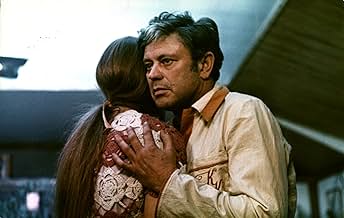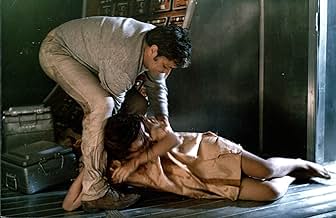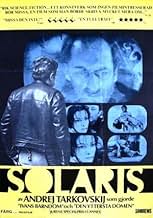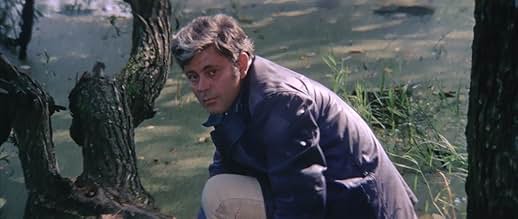Ein Psychologe wird zu einer Station geschickt, die einen fernen Planeten umkreist, um herauszufinden, was die Crew verrückt gemacht hat.Ein Psychologe wird zu einer Station geschickt, die einen fernen Planeten umkreist, um herauszufinden, was die Crew verrückt gemacht hat.Ein Psychologe wird zu einer Station geschickt, die einen fernen Planeten umkreist, um herauszufinden, was die Crew verrückt gemacht hat.
- Regie
- Drehbuch
- Hauptbesetzung
- Auszeichnungen
- 2 Gewinne & 4 Nominierungen insgesamt
- Doktor Snaut, kibernetik
- (as Yuri Yarvet)
- Mat Krisa Kelvina
- (as O. Barnet)
- Syn Anri Bertona
- (as V. Kerdimun)
- Gostya doktora Gribaryana
- (as O. Kizilova)
- Plemyannitsa Krisa Kelvina
- (as T. Malykh)
- Shanakhan, predsedatel komissii Anri Bertona
- (as A. Misharin)
- Professor Tarkhe
- (as B. Oganesyan)
- Anna, tetka Krisa Kelvina
- (as T. Ogorodnikova)
- Doktor Gribaryan, fiziolog
- (as S. Sarkisyan)
- Predsedatel nauchnoy konferentsii
- (as Yu. Semyonov)
- Chlen uchenogo soveta
- (as V. Statsinskiy)
- Professor Messendzher
- (as G. Teykh)
Empfohlene Bewertungen
As some other reviewer said, I had the feeling through the first one hour or so that some scenes went on for too long, or seemed a bit unnecessary and that it was too slow for the message to clearly be presented. But after a while, the slow pacing DID have a positive impact on the context of the film and on the "dialogue" between the film and the viewer. Anyway, after its plain & simple beginning, when the "action" is taken to the space station things get more and more interesting. No spoon-feeding here, as well. If you want all the mysteries in a film to be solved and explained, then you might not wanna see this, because the film is up to the viewer to think and dive in deep. Anyway, it ended up satisfying and leaving one in thoughts.
I am so glad I got to see this fabulous thoughtful movie. It's full of nice visuals and context. A recommendation to all who are fed up with Hollywood crap - but even Hollywood geeks could find many in this, if they can tolerate with the slow pace...
So comes December 2009, and Film 4 show both Solaris films. I sat transfixed by the Russian film. Visually it is a thing of beauty, and it is a rare thing - a film which requires input from the viewer. This movie requires you to think for yourself...and some people find that difficult.
I enjoy a rip-snorting entertaining action movie as much as most people, but rare films like Solaris leave me feeling so much more fulfilled. There are ambiguities, not so much loose ends untied as dots which the viewer is required to connect for himself.
Try Solaris. If you find yourself twiddling your thumbs after 15 minutes then its probably not for you. If you find yourself glued to the screen then you know how I feel about this film.
I know that many friends to whom I've shown this move did not understand it. So I'm not saying you'll like it. But this is possibly the best (non-action) sci-fi movie ever made.
Watch it at night, alone, when everything out of your home is dark, silent, and cold.
As with most movies that have been saddled with the word "greatness," I understand why "Solaris" is considered to be such a watershed movie and so revered by so many, but I have to admit that I didn't personally feel myself responding to it all that much. Maybe I would on a second (or third or fourth) viewing, but I can't say I'm very compelled to watch it again. It's cerebral and philosophical, which I expected, and a bit cold and emotionally uninvolving despite the fact that it's about almost nothing but human emotions and how we react to life's biggest mysteries. I didn't warm much to the characters or ever really think of them as individual human beings so much as necessary conduits for communicating the film's philosophical ruminations. Despite being set in the vast reaches of space, it's a claustrophobic movie, which I think is intentional. We never see space, only the cramped interiors of a spaceship, and that feels right, since the movie is more about the vast universe contained within Man's head than it is about the great physical universe beyond our solar system's borders.
What I liked most about "Solaris" is that it suggests that Man isn't really developed enough to handle breakthroughs in our understanding of the larger universe. Given the chance to explore space and engage with elements beyond our comprehension, the characters in the movie instead spend all of their time ruminating over and regretting the people they left behind on Earth and the mistakes they made there. It's almost like Mankind turns to solving giant huge mysteries as a distraction from the fact that we're not capable of cracking the lesser, more mundane mysteries of everyday life, like love, commitment, and dependence on one another.
"Solaris" does have one chilling and memorable ending, I'll give it that. If we go poking around in what we don't understand, it seems to say, we may very well find ourselves unable to return to what we do.
Grade: A-
The basic story is that a Russian spaceship in orbit around a planet has been sending back confusing status, and Kris Kelvin (Donatas Banionis) is sent to investigate. He finds out that the crew has been experimenting with sending pulses of radiation into the planet's vast ocean and are in turn manipulated by some sort of innate intelligence on the planet. "Guests" materialize on the ship, crafted from mental elements of the crews' minds.
The first night there, Kris himself wakes up to find his long-dead love Hari (Natalya Bondarchuk) by his side. The other two crew mates, scientists Dr. Snaut (Jüri Järvet) and Dr. Sartorius (Anatoli Solonitsyn) puncture any misconceptions that Kris may have by clarifying that "she" is not real, and invite Kris to try looking at a blood sample, which clearly is not human ("she" does "bleed" when hurt, but the "blood" can be easily wiped away). The scientists in fact want to experiment on sending an annihilation sacrificial pulse of radiation to the ocean below, and imply, it seems, an interest in using Hari for that purpose.
The film is unlike anything that I have seen before, and begs many philosophic questions about the nature of reality and existence, the meaning of love, time and timelessness, and much more. The sterile and very unnatural milieu of the spaceship, as well as the melancholic and minimalistic music and sound effects, make one despair for being in nature, and reflect on the early lakeside scenes. The ending (no spoilers here!) leaves room for interpretation and even understanding of just what happened. Hauntingly amazing.
Wusstest du schon
- WissenswertesThis was the most widely seen of Andrei Tarkovsky's films outside of the Soviet Union. However, Tarkovsky himself reportedly considered it the least favorite of the films he directed. Not being a fan of the science fiction genre (which he criticized for its "comic book trappings and vulgar commercialism"), he was nevertheless persuaded to propose this adaptation of the eponymous and popular sci-fi novel 'Solaris' to appease the Soviet censors. However, he considered the film an artistic failure because of its need for technological dialogue and special effects, which prevented it from transcending its genre; something he believed his movie Stalker (1979) did better.
- PatzerAt the moment when the station attains zero gravity, the candlestick passes floating in the air, with the flames burning the same as in earth. Actually, with zero gravity, the fire doesn't go upward, candle flames would rather be spherical and very weak (blue).
- Zitate
Dr. Snaut: Science? Nonsense! In this situation mediocrity and genius are equally useless! I must tell you that we really have no desire to conquer any cosmos. We want to extend the Earth up to its borders. We don't know what to do with other worlds. We don't need other worlds. We need a mirror. We struggle to make contact, but we'll never achieve it. We are in a ridiculous predicament of man pursuing a goal that he fears and that he really does not need. Man needs man!
- Alternative VersionenThe Region-4 DVD was released by Shock as part of its Distinction Series and runs at 2 hours and 49 minutes, with some noticeable cut scenes throughout the films. This 2-disc set doesn't contain any deleted/alternate scenes.
- VerbindungenEdited into Spisok korabley (2008)
- SoundtracksThe Little Organ Book: Ich Ruf Zu Dir, Herr Jesu Christ - BWV 639
Composed by Johann Sebastian Bach (as I. S. Bakh)
Top-Auswahl
- How long is Solaris?Powered by Alexa
- Who is the midget in Sartorius' room?
- What's the meaning behind the switches between black-and-white scenes and color scenes throughout the movie?
- Who composed the main theme of this film, and what is the name of the piece?
Details
- Erscheinungsdatum
- Herkunftsland
- Offizieller Standort
- Sprachen
- Auch bekannt als
- Điều Tạo Nên Con Người
- Drehorte
- Akasaka, Minato, Japan(Berton's car scenes)
- Produktionsfirmen
- Weitere beteiligte Unternehmen bei IMDbPro anzeigen
Box Office
- Budget
- 1.000.000 RUR (geschätzt)
- Bruttoertrag in den USA und Kanada
- 22.168 $
- Eröffnungswochenende in den USA und in Kanada
- 11.537 $
- 15. Sept. 2002
- Weltweiter Bruttoertrag
- 230.859 $
- Laufzeit2 Stunden 47 Minuten
- Farbe
- Sound-Mix
- Seitenverhältnis
- 2.35 : 1
Zu dieser Seite beitragen
































